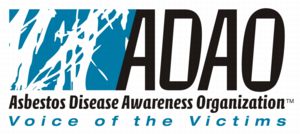

AsbestosDiseaseAwareness.Org
U.S.
Senate Hearing
ADAO
Leadership Testifies Before U.S. Senate
By: Laurie Kazan-Allen, Guest Writer

Linda Reinstein

Dr. Richard Lemen
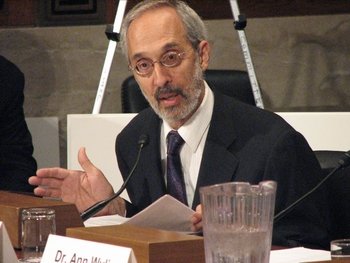
Dr. Barry Castleman
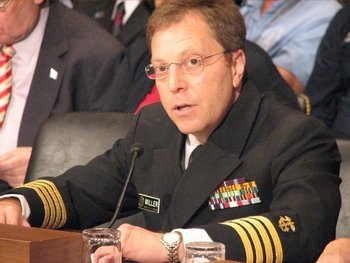
Dr. Aubrey Miller
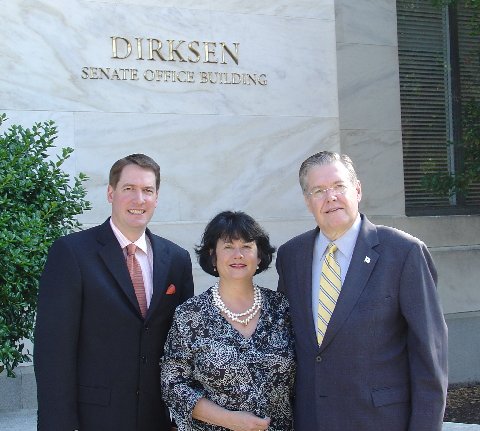
Doug Larkin, Linda Reinstein, Dr. Lemen
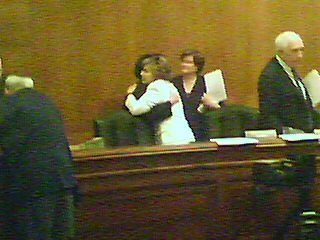
A comforting post-hearing hug between
Linda Reinstein and Senator Boxer
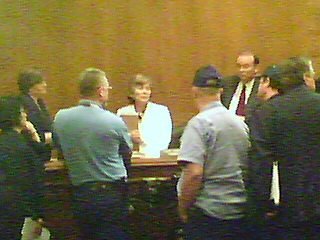
An impromptu post-hearing discussion
with the Capitol Tunnel Workers
and Senator Boxer
On June
12, 2007, the U.S. Senate Committee on Environment and Public Works
(EPW) heard testimony about the health effects of asbestos. Senator Barbara Boxer, the panel’s chairwoman,
confirmed that in 2005, 2,530 metric tons of asbestos and 90,000 metric
tons of asbestos-containing cement products, gaskets, brakes and clutch
parts were imported into the U.S. Furthermore, she added: “Worldwide
production of asbestos actually increased in 2005, from 2.36 million
metric tons in 2004 to 2.4 million metric tons in 2005.” Expressing her
support for Senator Patty Murray’s bill, S.742, the Ban Asbestos in
America Act of 2007, Senator Boxer concluded that in the face of the
“terrible price” paid by ordinary Americans for the use of this toxic
substance and in light of the availability of safer non-asbestos
alternatives, the use of asbestos in the U.S. should be discontinued.
Senator
Murray described the six year fight to get her bill enacted and asked:
“How many more Americans have to die before our government finally does
the right thing and bans asbestos?” Paying tribute to three of the
other witnesses, Dr. Barry Castleman, Dr. Dick Lemen and Linda
Reinstein, Senator Murray summed up the facts as follows:
- asbestos is deadly,
- it’s devastating families
and communities,
- and every day that we wait
to ban it, we’re sentencing more Americans to an early and avoidable
death.
Not only does Murray’s bill
ban the import, manufacture, processing and distribution of products
containing asbestos, it also includes plans to launch a public
education campaign to highlight the occupational and environmental
asbestos hazard and proposes that the sum of $50 million be allocated
to expand research into and treatment of asbestos-related diseases and
create a national research and treatment network.
Within
the U.S. the consequences of hazardous asbestos exposures are of
epidemic proportions. As many as 231,000 people have died from
asbestos-related diseases in the U.S. since 1980; an equal number could
die by 2040 according to testimony given at the hearing. Dr. David
Weissman, from the National Institute for Occupational Safety and
Health, informed the Committee that deaths from the asbestos cancer
mesothelioma are increasing. Dr. Richard A. Lemen, former Assistant
Surgeon General, testified:
“Today we know that various
cancers, including lung cancer, gastrointestinal cancers, and
mesothelioma are all causally associated from exposure to asbestos. I
cannot tell any of you, on this Committee, why some will develop
asbestosis or other asbestos-related cancers and why others won’t. But
what I can tell you is that asbestos-induced diseases are preventable.”
Mrs. Linda Reinstein, whose
husband Alan died tragically from mesothelioma in 2006, spoke of the
devastation asbestos disease brings to American families:
“Most Americans trust their
air, soil and water are safe from toxic contaminants -
but as victims, we know the truth. For a century, asbestos
exposure has been linked to incurable diseases, yet we continue to face
an enormous man-made public health crisis… The stress and trauma is
life altering for those Americans with known asbestos exposure waiting
for time to reveal their medical fate... Mesothelioma patients’ medical
expenses can exceed $1 million – until death.”
According
to Environmental Consultant Dr. Barry Castleman, every hour someone
dies in the U.S. from an asbestos-related disease. The illegal absence
of warnings on the labels of contaminated goods continues to endanger
human life; unsuspecting users of asbestos-contaminated products such
as Durham’s Water Putty, on sale at hardware stores across the country,
are still being exposed to this lethal material. Dr. Castleman urged
the Senators to “ban asbestos in the US now. It is long past time for
the US to take a 21st century position on this issue and catch up to
Croatia by banning asbestos.”
Two
of the witnesses, Drs. David Weill and Anne Wylie, were singled out for
special attention by Chairwoman Boxer who, towards the end of the
session, questioned them about their connections to U.S. asbestos
defendants. After some very uncomfortable moments, they were both
forced to admit their industry links. Senator Boxer also asked Wylie
why she, a geologist, was prepared to testify as to the health effects
of asbestos exposures when the United States Geological Survey
categorically stated that this subject was not within a geologist’s
expertise. Having not yet finished with Dr. Weill, the Chair picked up
on his earlier comments about what was and was not a “tolerable risk.”
Failing to receive a satisfactory explanation from him, she asked Mrs.
Reinstein whether her daughter felt the loss of her Father was
“tolerable.” In just a few words, the asbestos widow spoke eloquently
about her family’s loss. No one in the chamber was left in any doubt
that even one death from asbestos was unacceptable and that the
continued use of asbestos in the U.S. was unconscionable. Drawing the
hearings to a close, Senator Boxer pledged her support for the Ban
Asbestos in America Act.
In
six years, this is the most significant progress Murray’s bill has
made. The June 12 meeting, which was the first full committee hearing
to consider the bill, marked a milestone in the bill’s passage through
Congress. Once the draft legislation receives EPW approval, it goes to
the full Senate and the House of Representatives. It could reach the
Senate floor after the Summer recess and become law by the end of 2007.
All testimonies and the
archived hearing webcast can be viewed online HERE:
Laurie
Kazan-Allen is the Coordinator
of the International
Ban
Asbestos
Secretariat
Linda
Reinstein’s
updated testimony with supporters
A note of thanks …
With a single email request and within 48
hours, our
volunteers garnered more than 500 signatures from
family, friends, doctors and association's who:
1. Support a ban of asbestos
2. Agree that there is no safe level of
exposure
3. Invest in research for improved
treatments and a cure
4. Educate Americans of the dangers and
how to prevent exposure
It is a testament to the interest rarely given
credit.
The ADAO is a registered 501(c)(3) nonprofit volunteer organization.
The Asbestos Disease Awareness Organization
1525 Aviation Boulevard, Suite 318 • Redondo Beach • California • 90278 • 310.437.3886
www.AsbestosDiseaseAwareness.Org
Info@AsbestosDiseaseAwareness.Org
| Sign up for Important Updates and eNewsletters |